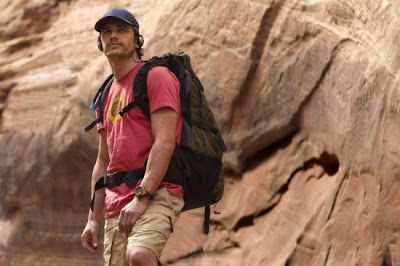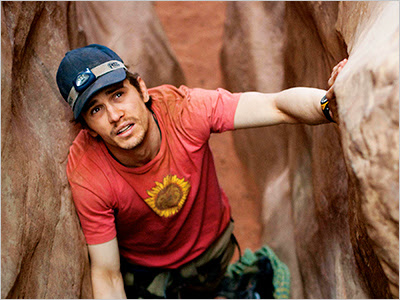Danny Boyle's follow-up to Slumdog Millionaire is visceral filmmaking at its best, infused with the director's signature kinetic style and meticulously crafted to elicit a physical response from the audience. And while the subject matter definitely covers some dark territory, ultimately this movie (like Aron Ralston himself) rises above those aspects and emerges an inspiration to everyone.
127 Hours
Director: Danny Boyle
Starring: James Franco, Clemence Poesy, Kata Mara, Amber Tamblyn
The movie tells the incredible (and I don't say that lightly) true story of Aron Ralston, a hiker who, after being caught in a Utah canyon for five days in 2003, cut off his own arm with a dull blade and hiked miles to safety to survive. Boyle and his co-writer Simon Beaufoy (Slumdog Millionaire, The Full Monty) took occasional liberties with the story to form a better narrative, but for the most part the events are an accurate depiction of Ralston's trials in Blue John Canyon.
Stylistically, 127 Hours continues Danny Boyle's fantastic recent trend of energetic filmmaking. This movie does conjure recent memories of Rodrigo Cortes' Buried with its "trapped in one place" experimental style, but there's a distinct difference between the two: while 127 Hours spends a majority of the time in one location, it does have the freedom to expand and cover more ground. The opening scenes are particularly effective examples of this: Ralston's preparation for his bicycle/hiking excursion (including a heartbreaking "almost had it" moment where he forgets his Swiss Army knife) are included within a split-screen format aside throngs of people moving en masse down busy sidewalks, representing the heartbeat of society from which he is so desperately trying to escape. His perceived independence, of course, is nearly his downfall - and as he drives toward the desert, passing fast food restaurants and leaving the lights of the city behind, he gets excited.
His brief separation from humanity is cut short the next morning (after a fantastically dynamic mountain biking scene through the desert, past more abandoned buildings - further relics of society) when he encounters Kristi (the always wonderful Kate Mara) and Megan (Amber Tamblyn), two hikers a bit out of their element in a landscape in which Ralston is utterly familiar. After introductions and some endearingly awkward humor, Ralston leads the girls to an underground swimming pool, a moment captured on his video camera that he revisits during his upcoming ordeal. In an arrangement I can't remember seeing in recent years, Boyle's dueling directors of photography (Anthony Dod Mantle and Enrique Chediak, who both do fantastic work here) take this as an opportunity to show off some dazzling camerawork, including a plunge from a canyon above into the water, following the three adventurers as they drop into the water. These girls are the last people Ralston will see before his incident, and the life and exuberance they radiate is an unsettling reminder of an event Ralston may never again experience. "Rock on," he says as he leaves the girls to continue his hike, unaware that his motto is about to take on a literal meaning.
I haven't yet mentioned James Franco as Aron Ralston, an actor who has shown remarkable range in the past few years and one who is almost assured an Oscar nomination for his astonishing work in this film. Like Ryan Reynolds in Buried, this is essentially a one-man show for Franco, who dives headfirst into the challenge and delivers perhaps the most emotional performance of his career. Franco easily has the capacity for the mental gymnastics necessary - which are many, as this is almost more of a mental endurance test than a physical one - but he also embodies the physicality needed to convince us he's the type of guy who can, on a normal day, pull off an expedition like this without a hitch. He gives Ralston an emotional arc that is entirely believable, one that begins with his escape from humanity and concludes with his desperate return to it, and with his declaration of "I need help," he sheds all pride in the process.
A large portion of the film is spent alone with Franco in a canyon, and on the surface I can see how that might sound boring. But Boyle is able to make it totally compelling from both a storytelling and visual standpoint. Ralston uses his video camera to record messages to his family (one particularly memorable scene involves him interviewing himself as a fictional game show host that reminded me of Jack Nicholson's Joker), and Boyle comments on technology in an interesting way over the course of the film. With all of Ralston's efforts to escape society, it is technology which he turns to in times of need so he doesn't go crazy. Even the illusion of speaking to someone (though there's not another physical person in the canyon with him) seems to support the fact that humans are communal beings, and connectivity is what we thrive on as a functioning civilization. Boyle and his editor Jon Harris also employ flashback scenes with various family members (Treat Williams, Lizzy Caplan) and ex-lovers (In Bruges' Clemence Poesy) mixed with premonitions of family yet to be born in order to keep the audience's collective attention.
Boyle reteams with Slumdog Millionaire collaborator A.R. Rahman for the score, which is at alternating points nostalgic and intensely immersive. Utilizing the guitar as his main instrument, Rahman composes a variety of tracks that perfectly accentuate the events on screen: as the sun streams through Ralston's canyon, the music turns warm and acoustic; as a flash flood enters, colder harsh tones give a foreboding sense that death is only seconds away. In the gruesome climactic amputation scene, an electric feedback noise screams through the speakers as Ralston touches exposed nerves in his arm before he cuts through them. It reminded me of a real life game of Operation.
Like his previous effort, Boyle has crafted a film that is an affirmation of life, a celebration of humanity and one of the best movies of the year. Films like this only come around every so often, so sit back, absorb, and enjoy it. Even if you don't care for the movie, respect the awe-inspiring fact that the real-life Aron Ralston is a living exemplar of a "never give up" attitude to which we all should aspire. Until next time...






No comments: